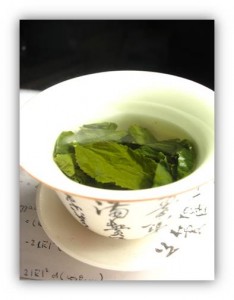
A popular request I get is related to the medicinal use of tea. I’m finally writing this article after discussing this topic with various Chinese friends who have nearly 20 years of experience in the tea business. After discussions with them and other trusted tea connoisseurs I’m ready to post on this topic. I suggest reading a previous post about understanding the world of tea in order to get more familiar with the major varieties of tea.
You’ll find that two major substances in tea do most of the leg work: epigallocatechin gallate (EGCG) and polyphenol. Remember: I’m not a doctor and the following is a collection of information told by friends, which I’ve cross-referenced with scientific studies.
Dieting: Pu’er Tea is known as the most effective of the major tea varieties for metabolizing fat, which is why it is often a major part of diet tea concoctions sold commercially. It isn’t a silver bullet to weight loss, but should be included as a supplement to your weight loss or dieting regimen. Pu’er Tea also has great benefits to combat heart disease, see below. Also see my overview and disambiguation of major teas here.
Cleansing and Digestion: From a Chinese perspective, “cleansing” means the process of pulling oil from your intestines. It doesn’t mean you should have diarrhea, but a person eating an oily-food diet will have better cleansing results. The precursor to cleansing is actually an improvement in digestion. Hopefully this serves to clarify what “cleansing teas” on the market should actually do.
Cancer and Degenerative Diseases: The most useful time to consume tea for the purpose of combating cancer is before the cancer in question has arrived. Tea, Green Tea in particular, is more effective with digestive and urinary tract cancers, however, there is a long list of other cancers that have been inhibited with animal testing, including:”lung, forestomach, esophagus, duodenum, pancreas, liver, breast, colon, and skin cancers”[*]
The immune system gets a boost from what The Green Tea Book articulates as the “secret ingredient”of Green tea, which is its high content of polyphenol (a phytonutrient). For people who crave details, the reason polyphenols are effective combatants to potential cancers is due to their high amounts of antioxidants. Basically, antioxidants prevent free radicals from flipping out all over the body and kicking off chain-reaction scavenging for reactive cells.[*] (In a nut shell free radicals damage cells, which can cause a range of problems from aging to cancer.)
A 2007 study done in China shows that Alzheimers and Parkinson‘s patients could have benefits from the polyphenol of Green Tea, because it “may protect neurons against the detrimental effects of reactive oxygen species (ROS) and nitric oxide (NO)…” Basically, with enough pure green tea extract (EGCG), it could inhibit the death of neurons which causes these degeneration, leading to Alzheimers and Parkinson’s.
The following are specific studies that I’ve grouped here and linked to their respective sources.
Heart Disease: There is a “preventative effect…on coronary heart disease, high blood cholesterol , and high blood pressure…” according to a 2000 study published in the American Journal of Clinical Nutrition.
Skin Damage: Topical applications of green tea extracts (EGCG) have protective effects on UVA- and UVB-induced skin damage (photoaging and carcinogenesis) [*]
Lung Cancer: “Among smokers, those who did not drink green tea at all were more than 12 times as likely to develop lung cancer than those who drank at least a cup a day.” (Read more in this BBC review of the study) Of course, quitting smoking makes more sense…
Stress: A study released in 2010 by University College London shows that black tea consumption after a stressful event can reduce levels of the stress hormone “cortisol”. [*]
Stroke: In 2009, University of California, Los Angeles (UCLA) conducted research which found that “drinking three or more cups of tea per day can reduce the risk of suffering a stroke by as much as 21 per cent.” [*]

 Custom Search
Custom Search
Pingback: My Journey with Chinese Chiropractic (Part 1) | Asian Living.me
Pingback: Coffee for Tea Drinkers | Asian Living.me
Pingback: Green Tea To-Go! | Asian Living.me